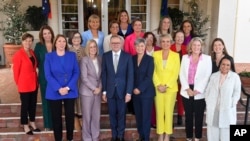Climate change and the economy are emerging as key challenges for Australia’s new left-of-center government. Almost two weeks after the May 21 election, Labor has now won enough seats to form a majority government after the counting of postal votes. There is also a record number of women in Cabinet.
“This is far more representative than any government party room has ever been in our history. We are making progress,” said Prime Minister Anthony Albanese.
Ten women are in the 23-member Cabinet. Analysts believe the appointments carve out space for improving gender parity in what has been a male-dominated political culture in Australian politics.
Anika Wells, the new minister for Aged Care and Sport, said she’s ready for the task ahead. “I feel very honored that I have been given such a big reform task to do in the Albanese Labor government and I’m really looking forward to getting started.”
Cost-of-living pressures were a keen concern for voters leading up to the May 21 election. The COVID-19 pandemic has left Australia with record amounts of government debt following massive jobs and wages subsidies during the pandemic.
Managing the economy will be the government’s main domestic focus, said Stewart Jackson, a senior lecturer in the department of government and international relations at the University of Sydney.
“The biggest domestic concern that Labor faces now is the budget and indeed the slowly declining economic situation finds itself in,” he said.
Australia has tried to counter China’s growing diplomatic ambitions in the South Pacific. Beijing recently signed a security pact with Solomon Islands but has failed to persuade other island nations to join a broader regional accord.
Australia this week sent its foreign minister Penny Wong to Samoa and Tonga.
Jackson believes that Canberra’s commitments on climate change, another key challenge for the Labor government, will be well received within the region.
“Climate change is, of course, the issue of the day for many of the South Pacific nations,” he said. “So, actions by Australia on climate change will actually have a positive impact on the South Pacific and certainly Australia’s slightly frayed relations with near neighbors. China is ever present, but I do believe that the ALP (Australian Labor Party) will look to diplomacy, rather than saber-rattling, to improve the relationship.”
Australia has had just one female prime minister. But the new parliament is diverse with a record number of Indigenous members, along with others with Asian heritage.
And with a majority in parliament, Labor’s policy agenda will be easier to implement.







